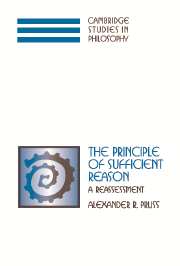Book contents
- Frontmatter
- Contents
- Acknowledgments
- Part I The Principle of Sufficient Reason and the Causal Principle
- Part II Objections to the PSR
- 4 A Modern Version of the Hume Objection
- 5 The Anti-theological Argument That There Are No Necessary Beings
- 6 Modal Fatalism
- 7 Free Will
- 8 Quantum Mechanics
- 9 Turning Leibniz against the PSR
- 10 What Survives the Criticisms of the PSR?
- Part III Justifications of the PSR
- Bibliography
- Index
6 - Modal Fatalism
Published online by Cambridge University Press: 27 July 2009
- Frontmatter
- Contents
- Acknowledgments
- Part I The Principle of Sufficient Reason and the Causal Principle
- Part II Objections to the PSR
- 4 A Modern Version of the Hume Objection
- 5 The Anti-theological Argument That There Are No Necessary Beings
- 6 Modal Fatalism
- 7 Free Will
- 8 Quantum Mechanics
- 9 Turning Leibniz against the PSR
- 10 What Survives the Criticisms of the PSR?
- Part III Justifications of the PSR
- Bibliography
- Index
Summary
VAN INWAGEN'S ARGUMENT
Peter van Inwagen (1983, pp. 202–204) has formulated an influential and elegant reductio ad absurdum of the PSR. Let p be the conjunction of all contingent truths. If p has an explanation, say, q, then q will itself be a contingent truth, and hence a conjunct of p. But then q will end up explaining itself, and that would be absurd. We can formulate this precisely as follows:
(33) If the PSR holds, then every true contingent proposition has an explanation. (Premise)
(34) No necessary proposition explains a contingent proposition. (Premise)
(35) No contingent proposition explains itself. (Premise)
(36) If a proposition explains a conjunction, it explains every conjunct. (Premise)
(37) A proposition q only explains a proposition p if q is true. (Premise)
(38) There is a Big Conjunctive Contingent Fact (BCCF) that is the conjunction of all true contingent propositions, perhaps with logical redundancies removed, and the BCCF is contingent. (Premise)
(39) Suppose the PSR holds. (For reductio)
(40) Then, the BCCF has an explanation, q. (By (33), (38) and (39))
(41) The proposition q is not necessary. (By (34), (38), and (40) and as the conjunction of true contingent propositions is contingent)
(42) Therefore, q is a contingent true proposition. (By (37), (40), and (41))
(43) Thus, q is a conjunct in the BCCF. (By (38) and (42))
(44) Thus, q is self-explanatory. (By (36), (40), and (43))
(45) But q is not self-explanatory. (By (35) and (42))
(46) Thus, q is and is not self-explanatory, and that is absurd. Hence, the PSR is false.
- Type
- Chapter
- Information
- The Principle of Sufficient ReasonA Reassessment, pp. 97 - 125Publisher: Cambridge University PressPrint publication year: 2006

